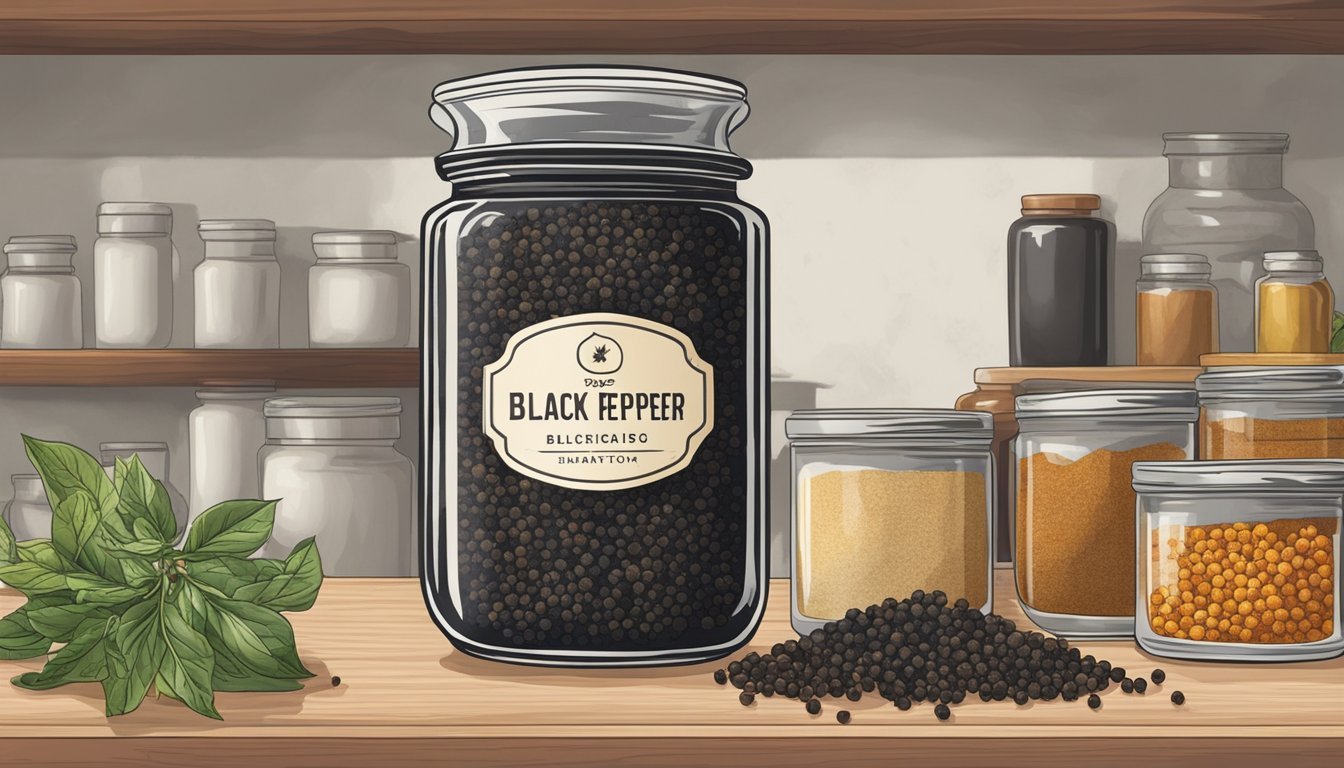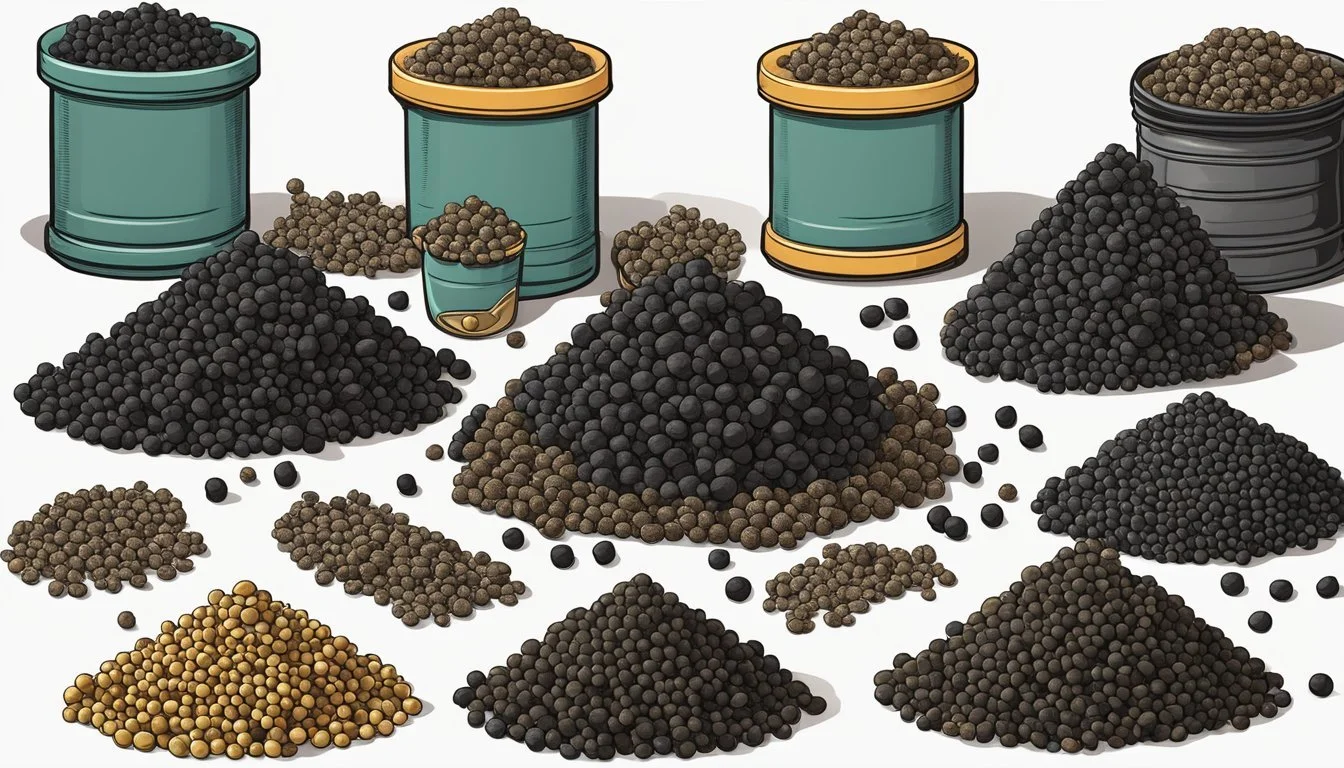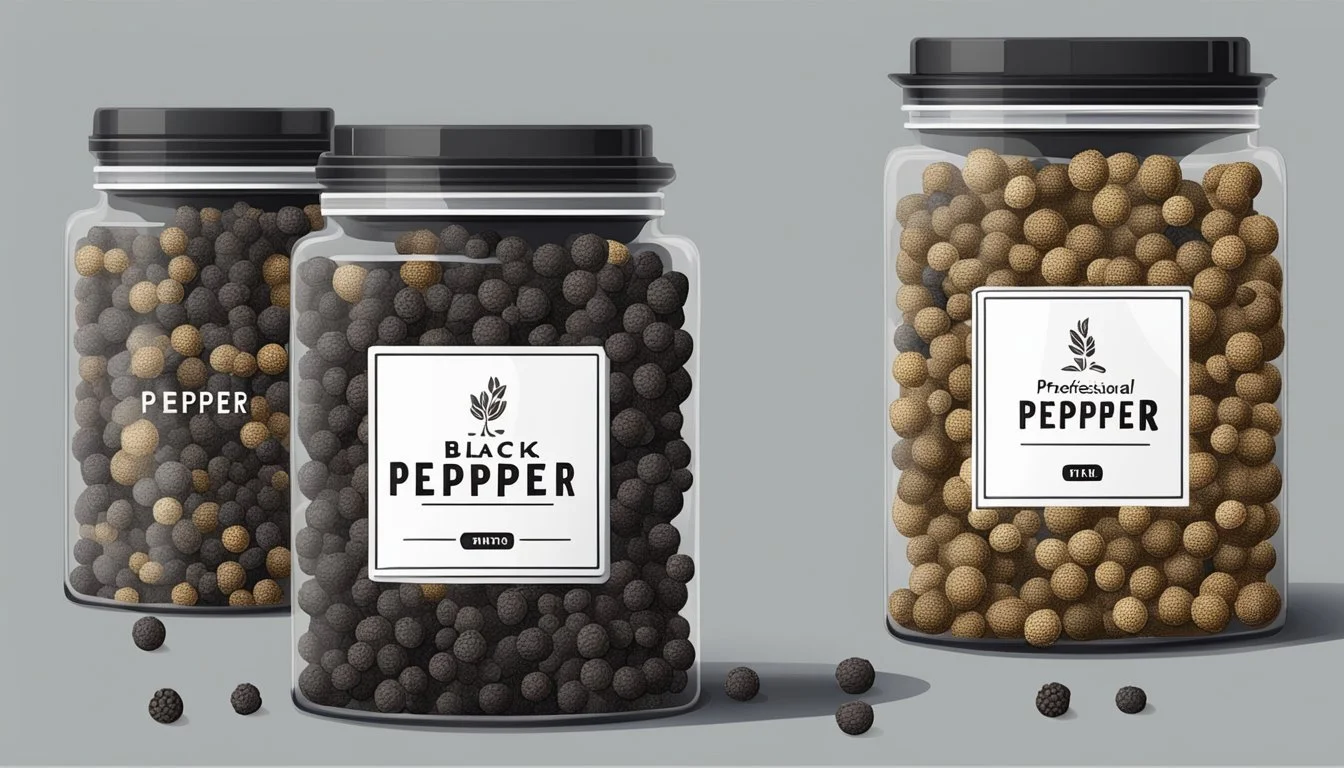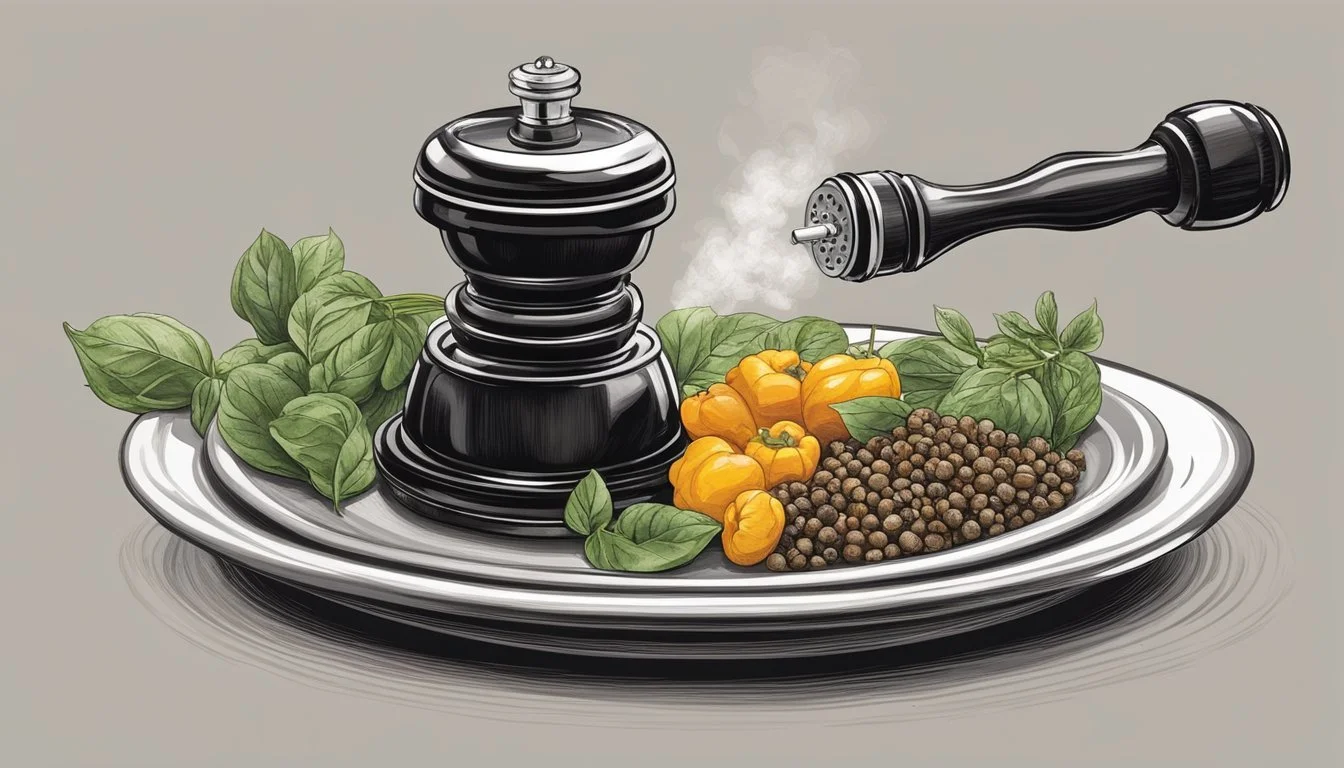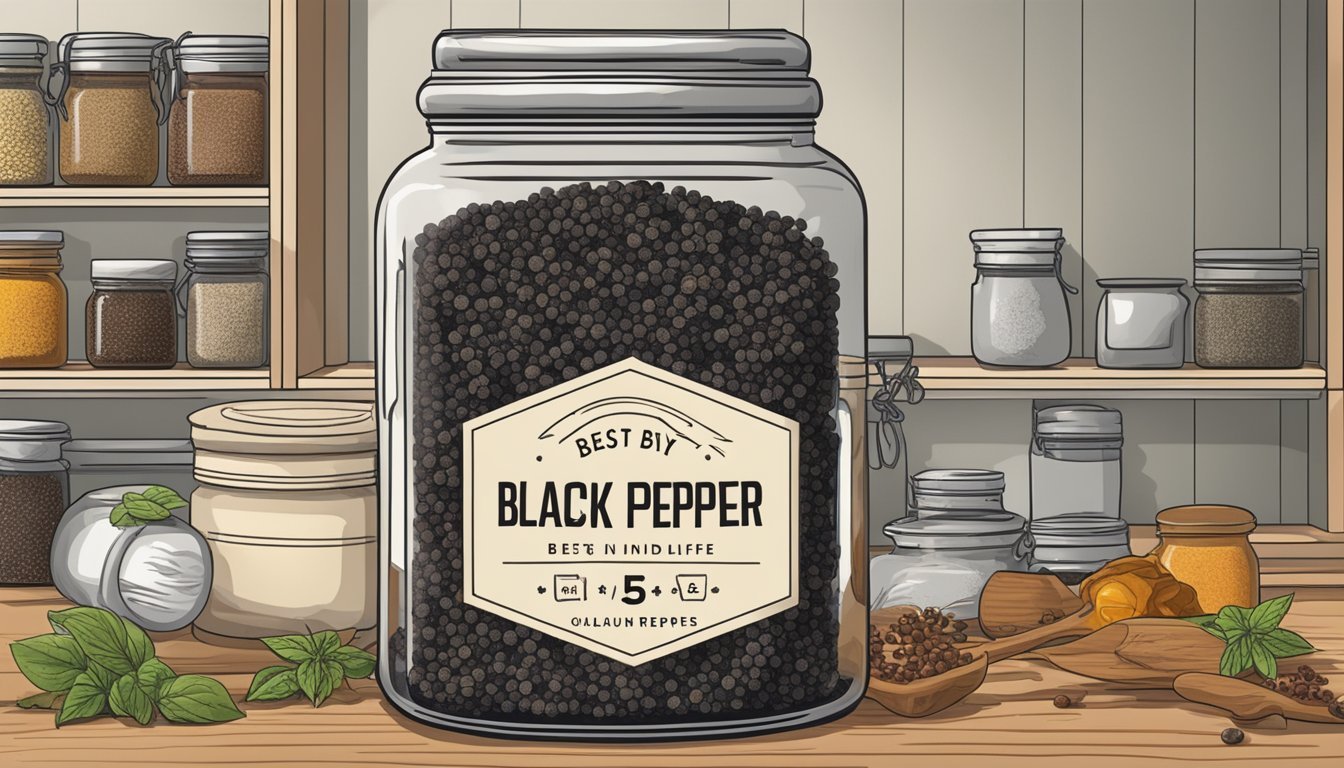Does Black Pepper Go Bad?
Essential Storage Tips and Shelf Life
Black pepper, a staple spice found in kitchens around the world, is known for its distinctive flavor and aroma that significantly enhances culinary creations. While it's common to wonder about the shelf life of this popular spice, it's essential to understand that black pepper, whether in ground form or as whole peppercorns, does have a finite lifespan. Ground black pepper can last up to three years with proper storage, while whole peppercorns can remain fresh for about four years.
Proper storage plays a crucial role in maintaining the quality and potency of black pepper. Keeping it in a cool, dry place away from sunlight and moisture will help preserve its flavor and aroma. Using an airtight container can prevent exposure to air, which can degrade its quality over time.
Despite its long shelf life, black pepper can go bad, especially if exposed to unfavorable conditions such as moisture, light, or heat. Signs that black pepper has deteriorated include a loss of heat, flavor, or a musty smell. Paying attention to these factors ensures that the spice you use continues to add robust flavor to your culinary dishes.
Understanding Black Pepper
Black pepper, known scientifically as Piper nigrum, is widely regarded for its sharp taste and fragrant aroma. It is used universally in culinary dishes and offers notable health benefits.
The Origins and Varieties of Black Pepper
Black pepper originates from the Malabar Coast of India and has been a prized spice for centuries. Known as the "king of spices," it was historically used in trade and has influenced various cuisines globally.
There are several varieties, including Tellicherry, Malabar, and Sarawak. Each variety has unique characteristics in terms of size, color, and flavor intensity. Whole peppercorns are the dried fruit, which can be ground into powdered form as needed.
Culinary Uses and Health Benefits
Black pepper is a versatile spice that enhances the flavor of countless recipes. Ground black pepper adds a sharp and robust taste to dishes, while whole peppercorns can be used for marinades, soups, and stews.
Health benefits include aiding digestion, promoting weight loss, and providing antioxidants. Compounds like piperine contribute to these benefits, improving nutrient absorption and supporting the immune system.
The Distinctive Characteristics of Black Pepper
Black pepper's distinctive characteristics include its sharp taste and fragrant aroma. Whole peppercorns retain their potency longer than ground pepper, making them ideal for culinary use.
The color of black pepper can range from dark brown to jet black, depending on the drying process. Freshly ground pepper has a more intense flavor compared to pre-ground varieties, which can lose potency over time if not stored properly.
Effective storage involves keeping black pepper in a cool, dark, and dry place, using airtight containers to preserve its quality and flavor.
Factors Affecting Black Pepper Quality
Quality, longevity, and freshness of black pepper are influenced by its exposure to environmental elements, storage conditions, and packaging. Each of these factors can significantly impact the spice's shelf life and potency.
Exposure to Elements
Black pepper's quality can degrade quickly when exposed to various elements. Air can cause the pepper to lose its potency, and exposure to moisture can lead to the growth of mold. Direct sunlight can break down the essential oils in black pepper, reducing its flavor and aroma.
To maintain freshness, it is crucial to keep black pepper in a cool, dry place. Humidity control is essential since pepper stored in a humid environment will spoil faster. Keeping the spice away from heat sources, such as the stove, is equally important to preserve its quality.
The Impact of Storage Conditions
Proper storage conditions are vital for maintaining black pepper's quality. Storing black pepper in an airtight container protects it from air and moisture, which are primary factors in spoilage. It is recommended to use glass, plastic, or ceramic containers.
The optimal location for storage is a kitchen cabinet or pantry that is cool and dry. Storing black pepper in a dark place helps prevent the degradation caused by light exposure. Consistent low humidity ensures that the spice does not absorb moisture, which can lead to mold and spoilage.
The Role of Packaging
Packaging plays a crucial role in the longevity and freshness of black pepper. Airtight packaging helps to protect the spice from air and moisture. If buying pre-packaged black pepper, ensure that the package is sealed tightly and stored away from light and heat.
When transferring pepper to a different container, consider using one that is airtight to maintain its potency and flavor. Glass and ceramic containers are preferred as they do not react with the spice and provide a strong barrier against environmental elements. Proper packaging significantly extends the shelf life of black pepper, keeping it fresh for years.
Storing Black Pepper Correctly
To maintain the freshness and potency of black pepper, both whole peppercorns and ground pepper need to be stored correctly. Proper storage conditions can significantly extend the shelf life, ensuring that the spice remains a valuable and flavorful staple in the kitchen.
Best Practices for Storage
Black pepper should be kept in a cool, dry place. Avoid storing it near heat sources such as stoves or ovens as well as in direct sunlight. Moisture and heat can degrade the spice over time. Ensure that pepper, whether whole or ground, is kept in airtight containers.
Opaque or dark-colored containers are preferable since they block light, which can negatively impact the pepper’s quality. Using tightly sealed, reusable, and resealable bags or containers helps to preserve the spice's freshness.
The Shelf Life of Black Pepper
Whole peppercorns have a longer shelf life compared to ground pepper. When stored properly, whole peppercorns can last up to 4 years, while ground pepper can maintain its quality for about 3 years.
Regularly checking the expiration date can help ensure that the pepper is still good to use. Even if it doesn’t go bad quickly, black pepper can lose its potency and flavor over time, indicating it might be time to refresh supplies.
Extending Freshness and Potency
To extend the freshness and potency of black pepper, consider buying whole peppercorns and grinding them as needed. This method retains more of the spice's natural oils and flavors.
For added longevity, storing black pepper in the freezer can be an option, although it’s less common. Ensure it’s in a tightly sealed container to prevent any moisture or odors from other foods.
Use spice racks located in a cool, dark area to keep black pepper in optimal conditions. This setup keeps the spice away from heat and light, further preserving its quality. Regularly inspect storage areas for any signs of moisture or contamination to maintain the pepper's top condition.
Signs of Spoilage and Safety
Black pepper can lose its potency and become unusable over time. Key indicators of spoilage include visual changes and alterations in smell.
Visual and Olfactory Indicators
One of the first signs that black pepper has gone bad is a noticeable change in its appearance. Ground black pepper might look clumpy or discolored. For whole peppercorns, look for any signs of mold or unusual spots.
Another clear indicator is smell. Fresh black pepper has a robust, pungent aroma. If it develops a bad smell or loses its strong scent, it's likely no longer good to use. Musty or mildew-like odors indicate possible mold contamination.
When to Discard Black Pepper
If black pepper shows any visual mold or significant discoloration, it's time to discard it. Even in the absence of visible mold, a loss of flavor or the presence of a foul smell are strong indicators that the pepper is bad.
Whole peppercorns can last several years, but ground pepper typically has a shelf life of 2-3 years. Always store black pepper in a cool, dry place to extend its shelf life and enhance food safety.
Enhancing Meals with Fresh Black Pepper
Using freshly ground black pepper can elevate the flavor of various dishes, offering a sharp and full flavor that complements a wide range of culinary creations. Knowing how to select and use a pepper mill, as well as pairing black pepper with other foods and spices, is essential for achieving the best results.
Selecting and Using Pepper Mills
A quality pepper mill is crucial for unlocking the full flavor of black pepper. Pepper mills grind peppercorns just before use, ensuring that the pepper's essential oils are fresh and vibrant when added to meals.
When choosing a mill, look for one with adjustable grind settings to control the coarseness of the pepper. A good pepper mill should also have a durable grinding mechanism, such as ceramic or stainless steel, which resists wear and tear over time.
To use the mill, fill it with whole peppercorns and adjust the grind setting according to your taste or the requirements of the recipe. Coarsely ground pepper works well for steaks and salads, while finely ground pepper is ideal for soups and sauces.
Pairing Black Pepper with Foods and Spices
Black pepper pairs exceptionally well with a variety of foods and spices. Its sharp taste enhances the flavor of meats, vegetables, and starches, making it a versatile seasoning in the kitchen.
Pepper is commonly paired with salt to balance and amplify flavors in dishes. Additionally, it works well with other spices like chili powder, cayenne pepper, and white pepper, providing complexity and depth to many meals.
Its versatility extends to sweet dishes, where a pinch of black pepper can complement fruity desserts by adding a subtle heat that contrasts with sweetness. For vibrant salads, combining black pepper with vinegar or citrus juice can enhance the acidity and create a more balanced taste profile.
Regulatory Standards and Recommendations
Black pepper, like other spices, is subject to specific regulatory standards to ensure its safety and quality. Understanding expiration dates and staying updated on safety protocols are crucial.
Understanding Expiration and Sell-By Dates
Expiration dates for black pepper primarily indicate the period during which the spice is expected to maintain optimal quality. While black pepper doesn't spoil in the same way as fresh produce, its potency and flavor can diminish over time.
Ground pepper tends to lose its flavor more quickly than whole peppercorns. Proper storage in air-tight containers, away from light and moisture, can help extend its shelf life. The USDA does not mandate specific expiration dates for spices, but manufacturers often provide them for quality control.
Staying Informed on Food Safety Protocols
Food safety for spices, including black pepper, falls under guidelines set by the FDA and USDA. Importers and domestic suppliers must adhere to strict safety standards to prevent contamination and ensure consumer health.
Key protocols include:
Ensuring storage conditions minimize exposure to humidity and contaminants.
Regular testing and quality checks to detect potential contaminants.
Compliance with USDA standards, including proper labeling of expiration dates and storage recommendations.
Consumers can ensure safety by purchasing from reputable sources and following recommended storage practices.

